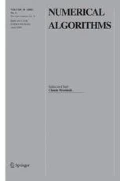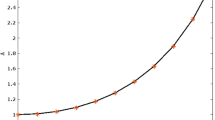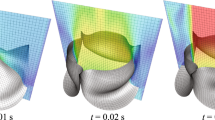Abstract
The divergence-free finite element method (DFFEM) is a method to find an approximate solution of the Navier–Stokes equations in a divergence-free space. That is, the continuity equation is satisfied a priori. DFFEM eliminates the pressure from the calculations and significantly reduces the dimension of the system to be solved at each time step. For the standard 9-node velocity and 4-node pressure DFFEM, a basis for the weakly divergence-free subspace is constructed such that each basis function has nonzero support on at most 4 contiguous elements. Given this basis, weakly divergence-free macroelements are constructed.
Similar content being viewed by others
References
R. Amit, C. Hall and T. Porsching, An application of network theory to the solution of implicit Navier-Stokes difference equations, J. Comput. Phys. 40 (1981) 183–201.
F. Brezzi and M. Fortin, Mixed and Hybrid Finite Element Methods (Springer, Berlin, 1991).
M. Crouzeix and P.A. Raviart, Conforming and nonconforming finite element methods for solving the stationary Stokes equations I, RAIRO R-3 (1973) 33–76.
J. Ellison, C. Hall and T. Porsching, An unconditionally stable convergent finite difference method for Navier-Stokes problem on curved domains, SIAM J. Numer. Anal. 24(6) (1987) 1233–1248.
M. Fortin, Old and new finite elements for incompressible flow, Internat. J. Numer. Methods Fluids 1 (1981) 347–364.
V. Girault and P. Raviart, Finite Element Methods for Navier-Stokes Equations (Springer, Heidelberg, Berlin, 1986).
J.W. Goodrich and W.Y. Soh, Time dependent viscous incompressible Navier-Stokes equations: the finite difference Galerkin formulations and stream function algorithms, J. Comput. Phys. 79(1) (1988) 113–134.
D.F. Griffiths, Finite element for incompressible flow, Math. Methods Appl. Sci. 1 (1979) 16–31.
D.F. Griffiths, The construction of approximately divergence-free finite element, in: The Mathematics of Finite Element and its Applications, Vol. 3, ed. J.R. Whiteman (Academic Press, New York, 1979).
D.F. Griffiths, An approximately divergence-free 9-node velocity element for incompressible flows, Internat. J. Numer. Methods Fluids 1(4) (1981) 323–346.
K. Gustafson and R. Hartman, Divergence-free basis for finite element schemes in hydrodynamics, SIAM J. Numer. Anal. 20 (1983) 697–721.
K. Gustafson and R. Hartman, Graph theory and fluid dynamics, SIAM J. Alg. Discrete Methods 6(4) (1985) 643–656.
C. Hall, Numerical solution of Navier-Stokes problems by the dual variable method, SIAM J. Alg. Discrete Methods 6(2) (1985) 220–236.
C. Hall, J. Peterson, T. Porsching and F. Sledge, The dual variable method for finite element discretizations of Navier-Stokes equations, J. Numer. Methods Engrg. 21 (1985) 883.
C. Hall and T. Porsching, Numerical Analysis of Partial Differential Equations (Prentice-Hall, Englewood Cliffs, NJ, 1990).
C. Hall and X. Ye, Construction of null bases for the divergence operator associated with incompressible Navier-Stokes equations, J. Linear Algebra Appl. 171 (1992) 9–52.
M. Heath, R. Plemmons and R. Ward, Sparse orthogonal schemes for structural optimization using the force method, SIAM J. Sci. Statist. Comput. 5 (1984) 514–532.
P. Hood and C. Taylor, Navier-Stokes equations using mixed interpolation, in: Finite Element Methods in Flow Problems, ed. J.T. Oden (UAH Press, Huntsville, AL, 1974) pp. 121–131.
Kaneko, M. Lawo and G. Theirauf, On computational procedure for the force method, Internat. J. Numer. Methods Engrg. 19 (1982) 1469–1495.
R. Stenberg, Analysis of mixed finite element methods for the Stokes problem: a unified approach, Math. Comp. 42 (1984) 9–23.
A.B. Stephens, J.B. Bell, J.M. Solomon and L.B. Hackerman, A finite-difference Galerkin formulation for the incompressible Navier-Stokes equations, J. Comput. Phys. 53 (1984) 152–172.
R. Temam, Navier-Stokes Equations: Theory and Numerical Analysis (North-Holland, Amsterdam, 1977).
X. Ye, Construction of divergence-free spaces for incompressible Navier-Stokes equations, Ph.D. dissertation, University of Pittsburgh, Pittsburgh, PA, and Technical Report ICMA–90–153 (August 1990).
O.C. Zienkiewicz, The Finite Element Method (McGraw-Hill, New York, 1977).
Author information
Authors and Affiliations
Rights and permissions
About this article
Cite this article
Ye, X., Hall, C.A. A discrete divergence-free basis for finite element methods. Numerical Algorithms 16, 365–380 (1997). https://doi.org/10.1023/A:1019159702198
Issue Date:
DOI: https://doi.org/10.1023/A:1019159702198




